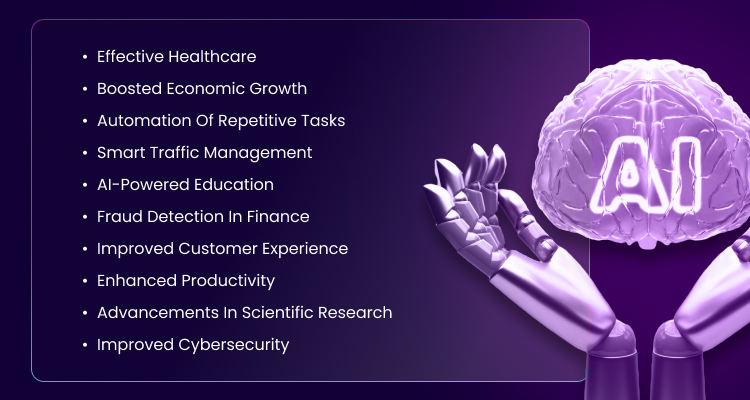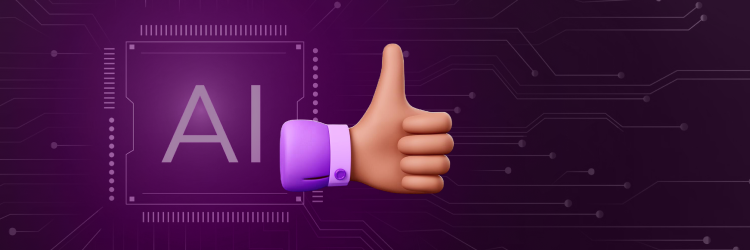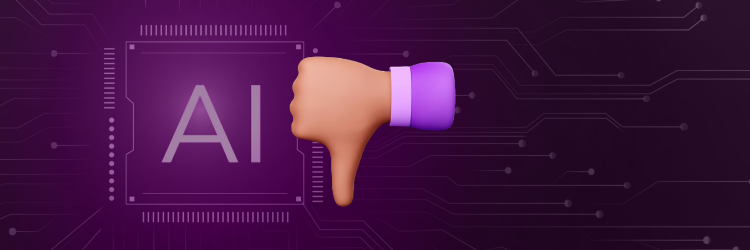
Artificial intelligence (AI) has become essential to daily life, shaping how we use technology. It powers tools like virtual assistants that set alarms and streaming platforms that offer personalized recommendations.
AI also supports advanced systems such as autonomous driving, where real-time decision-making ensures safety on the road. However, the benefits of AI go beyond these examples. It often impacts industries and routines in ways we may not immediately notice. This article explores the key benefits of AI and how it is transforming industries and everyday experiences.
What Is Artificial Intelligence?
Artificial intelligence is the ability of machines or computers to mimic human intelligence and learning behavior. This is achieved through extensive training data and AI algorithms. To go further, AI incorporates natural language processing, enabling it to interpret, understand, and respond to human language. This is usually used in large language models (LLMs) that power AI chatbots.
In addition, AI employs deep learning, a branch of machine learning that uses neural networks with many layers to identify complex patterns in large datasets. It also relies on computer vision to process and understand visual information, such as images or videos. All of these AI components work together to create systems that not only understand humans but also behave like us.
10 Benefits of AI

Artificial intelligence has become a key part of progress in many industries, making tasks easier and more efficient. Here are the most impactful benefits of AI across different sectors:
1. Effective Healthcare
AI has become integrated into various parts of the healthcare industry, improving diagnostics and personalizing treatment plans. It also helps complete tasks with minimal human effort, as seen in drug discovery, where it helps fasten drug trials and cut costs.
2. Boosted Economic Growth
AI has undoubtedly driven economic growth, particularly since the 2020 AI boom. Numerous innovations have opened new markets and boosted workforce productivity. SpringerOpen’s Journal of Economic Structure Research shows a positive link between AI and economic growth.
These advancements contribute to higher GDP and global competitiveness. While concerns about AI replacing jobs remain, it has created many opportunities for those willing to reskill and work alongside AI.
3. Automation of Repetitive Tasks
AI takes over repetitive tasks, saving time and reducing errors. It is used in customer service to summarize calls or detect spam emails. In manufacturing, AI-powered robots handle repetitive tasks like assembly, improving efficiency and accuracy.
4. Smart Traffic Management
AI helps manage traffic more effectively. Smart traffic lights adjust to real-time conditions, reducing delays and improving flow. Navigation apps use AI to suggest faster routes, making transportation smoother and more organized.
5. AI-Powered Education
AI has significantly benefited education, from AI chatbots like Mainstay to intelligent tutoring systems, classroom management, automated grading, and adaptive learning in apps like DreamBox. Bernard Marr, an expert on AI’s impact, notes that AI can help “make global classrooms available to all, including those who speak different languages or who might have visual or hearing impairments.” In short, AI is making teaching and learning more efficient.
6. Fraud Detection in Finance
AI helps detect fraud by spotting unusual patterns in data. It quickly adapts to new tricks and sends alerts in real-time. AI also makes payments safer and reduces risks for businesses and customers.
7. Improved Customer Experience
AI tools make customer service faster and more personal. Chatbots answer questions instantly, and recommendation systems suggest products people might like. This improves satisfaction and boosts sales.
8. Enhanced Productivity
AI automates processes, handles large datasets, and provides insights to improve productivity. In project management, AI helps prioritize tasks and allocate resources efficiently, ensuring deadlines are met.
For example, tools like Monday.com use AI to streamline workflows, while analytics platforms like those at Netflix analyze user behavior to identify opportunities and improve operations.
9. Advancements in Scientific Research
AI is transforming scientific research by analyzing large datasets and automating experiments. In drug discovery, it speeds up trials and lowers costs. This innovation allows researchers to make breakthroughs more efficiently and effectively.
10. Improved Cybersecurity
AI strengthens cybersecurity by quickly detecting and responding to threats. It monitors networks for unusual activity, identifies malware, and addresses vulnerabilities. Tools like Darktrace and CrowdStrike provide real-time protection, helping organizations keep systems secure.
Key Benefits of AI
AI offers many advantages, including automating repetitive tasks, improving education, and advancing healthcare.
AI in Automating Repetitive Tasks
AI is transforming workplaces by taking over repetitive tasks like data entry, scheduling, and inventory management. This saves time and reduces errors. For example, robotic process automation (RPA) handles high-volume tasks efficiently, easing the workload for employees.
By automating these tasks, AI allows workers to focus on creative and strategic work, such as product development, customer engagement, and long-term planning. This shift improves job performance and encourages innovation.
Industries like finance and manufacturing use AI to boost efficiency. Robots on assembly lines cut production time, while AI chatbots handle routine customer support questions, freeing staff for complex issues. These tools help businesses save time and improve productivity.
AI Benefits in Education
AI makes learning more personal. Adaptive platforms adjust lessons to fit each student’s pace and help them with specific challenges.
AI tools assist students with questions and assignments. For teachers, AI automates tasks like grading, freeing up more time for teaching.
Remote learning platforms also use AI to create content tailored for students worldwide, making education more accessible to all.
AI Benefits in Healthcare
AI is transforming healthcare by improving diagnoses and personalizing treatment plans. It processes patient data, like test results and medical histories, to help doctors make accurate decisions.
AI tools also detect diseases, such as cancer, earlier and with precision. Systems like IBM Watson Health support clinical decisions with evidence-based insights, making care more effective.
Additionally, AI automates hospital tasks like scheduling and patient monitoring. Wearable devices powered by AI track vital signs and alert doctors to potential issues in real-time.
Advantages and Disadvantages of AI
Advantages of AI

Artificial Intelligence (AI) is revolutionizing industries and everyday life in numerous ways. Here are some key advantages:
- Boosting Efficiency: AI quickly and accurately handles large amounts of data and repetitive tasks. This reduces human error and speeds up processes, helping businesses save time and money.
- Solving Complex Problems: AI analyzes complex data. It solves difficult problems, like predicting the weather and diagnosing diseases.
- Improving Production: AI automation helps in industries like manufacturing and logistics. It reduces mistakes, improves product quality, and smooths workflows. Robots on assembly lines are a key example.
- Speeding Up Research: AI accelerates discoveries in areas like medicine and climate studies by analyzing data faster. This has led to progress in cancer research, drug development, and understanding of genetic diseases.
- Powering Smart Technologies: AI uses deep learning to find patterns in data. This enables innovations like image recognition, language processing, and self-driving cars.
- Enhancing Customer Service: AI improves customer experiences through tools like chatbots and virtual assistants, which offer quick, personalized support.
- Improves Healthcare: By detecting diseases early, AI creates personalized treatment plans, and analyzes medical images.
- Encouraging Creativity: AI tools help create content in writing, art, and music. For instance, some AI tools assist with writing, while others generate images or designs.
- Optimizing Energy: Use AI to manage energy more efficiently. It can optimize renewables and reduce waste through smarter grids and systems.
Disadvantages of AI

While AI offers incredible benefits, it also comes with challenges and risks to which we must pay attention. They include:
- Ethical Issues: AI raises concerns about privacy, surveillance, and accountability. For example, facial recognition has been criticized for enabling surveillance, and some hiring tools have shown bias that leads to unfair treatment. These issues need to be addressed so that AI can be used responsibly.
- Overreliance on AI: Depending too much on AI can be risky. If systems fail or are hacked, they can cause major disruptions. Backup plans and safeguards are essential to prevent problems.
- Need for Human Oversight: AI applications in areas like healthcare or defense require human supervision. Human judgment is critical to avoid mistakes in high-stakes situations where AI alone isn’t reliable.
- Job Losses: AI automation may replace manufacturing, retail, and even office work jobs. To address this challenge, retraining workers and creating new jobs in AI-related fields can help.
- Bias in AI: AI can reflect the biases in its training data, leading to unfair outcomes in hiring, lending, or policing. Fixing these biases is key to building fair and trustworthy AI systems.
FAQs
How Does AI Benefit Society?
AI improves efficiency and accuracy. In logistics, it plans better delivery routes. In healthcare, it helps doctors diagnose illnesses more quickly.
What Are the Benefits of AI?
AI offers personalized learning in schools, helps find diseases early in healthcare, improves business operations, and improves customer experiences.
How Does AI Improve Decision Making?
AI studies large amounts of data to find patterns. This helps businesses and doctors make better choices based on facts.
How is AI Advancing Scientific Discovery and Addressing Complex Tasks?
AI plays a vital role in scientific discovery by handling complex tasks and analyzing massive datasets. Organizations like the World Economic Forum highlight AI’s potential to drive technological advancement in areas like climate modeling and medicine.
AI’s ability to process data at incredible speeds accelerates research and innovation. For example, generative AI is used in drug discovery, identifying new treatments quickly and at lower costs. In addition, AI supports production processes by performing dangerous tasks, reducing risks for human workers.
What Ethical Questions Arise with AI in the Hiring Process?
The use of AI technologies in the hiring process raises important ethical questions. For instance, AI can perform initial candidate assessments to evaluate resumes and match candidates to job roles. However, it’s crucial to have a human in the loop to ensure fairness and avoid bias during evaluations.
By automating routine tasks like screening applications, AI increases efficiency. But companies must carefully monitor AI programs to ensure they make unbiased decisions, promoting equality in recruitment practices.
Final Thoughts
AI offers many benefits, from boosting business efficiency to revolutionizing healthcare and education. It helps streamline tasks, makes decision-making smarter, and sparks innovation, making a real difference across industries. However, we should expect even more benefits as tech companies develop helpful AI innovations and products.
That said, it’s essential to approach AI responsibly. AI ethics can help us address ethical concerns, biases, and job impacts while embracing its potential. With the right approach, AI can truly help shape a better future.





















